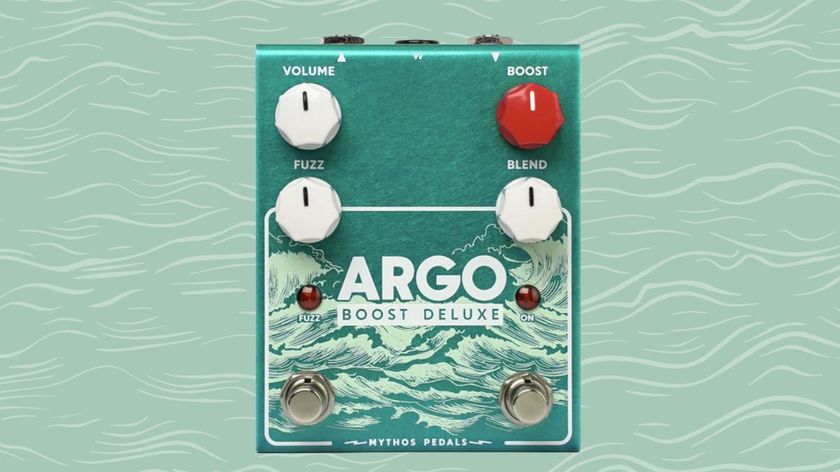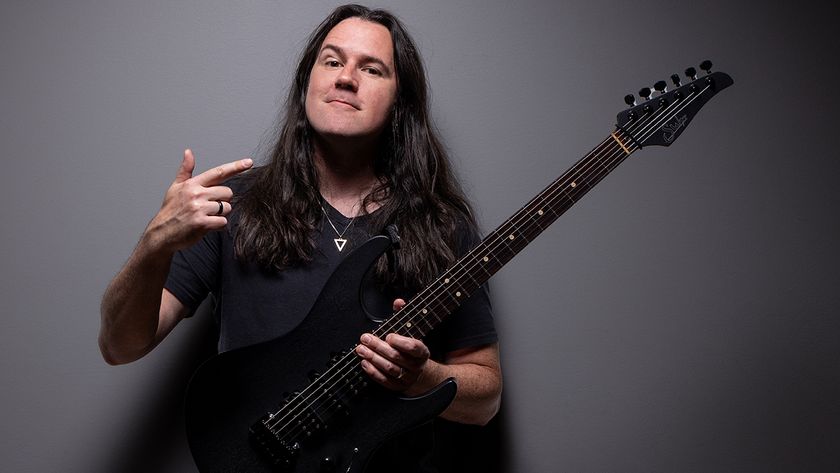“You’ve got three guitars, and nothing to prove”: Stephen Malkmus, Emmett Kelly, and Matt Sweeney discuss the country tracking tricks, experimentation, and East German fuzz pedal clones that power The Hard Quartet's self-titled debut album
The first LP from indie supergroup The Hard Quartet brings Pavement, Cairo Gang, and Chavez guitarists brilliantly together

The Hard Quartet is like an indie-rock Ocean’s Eleven in which everyone is the safe-cracker.
You have Emmett Kelly of The Cairo Gang and The Double, also a collaborator of Bonnie Prince Billy’s. Then there’s Matt Sweeney of Chavez and Superwolf, and alt-rock poet laureate Stephen Malkmus of Pavement. All three share guitar, bass, and vocals, with Jim White (Dirty Three, Xylouris White) completing the lineup on drums.
Malkmus isn’t sure why, but he was “basically quite confident” that something great would come out of putting the gang together.
“I knew I didn’t have to do anything – just play rhythm and it’d be cool, because you’ve got these guys,” he says. “You’ve got three guitars. Nothing to prove. Something’s gonna happen – could be me, could be them, could be us together.”
Music might be all math and physics; intervals, frequencies, amplitude, time. But Kelly says it’s “metaphysical” too. We’ll never fully understand how music works, and we wouldn’t want to. “If you figure out how to do it you’re just going to get bored really quickly,” he says.
The Hard Quartet’s debut is animated by all kinds of stylistic modulations, opening with the fuzz pedal revelry of Chrome Mess; the ‘70s Joe Walsh swagger of Earth Hater, complete with Syd Barrett chorus; the dusty-hot acoustic grit of Heel Highway; the bittersweet ecstasies of Rio’s Song and Our Hometown Boy; and indie-Yardbirds vibe of Action for the Military Boys.
Malkmus and Sweeney say it’s all possible thanks to White’s drumming. He’s a musical emulsifier pulling the others’ styles together. Maybe he was the safe-cracker all along: the enabler, taking some of the greatest guitarists and songwriters in alt-rock and indie, putting them in a room, and getting them to make a record greater than the sum of its parts.
Get The Pick Newsletter
All the latest guitar news, interviews, lessons, reviews, deals and more, direct to your inbox!

Chrome Mess just bubbles out of the speakers with a shifty, unpredictable T. Rex energy.
Sweeney: “I think that bubbly thing you mention is between Emmett and Jim doing something that’s unexpected; they’re listening, but it’s also really active. Like the hint at the chorus before the chorus happens; the way Jim comes in.”
Kelly: “I feel that’s the chemistry of the whole ensemble.”
The fuzz tone on that track is amazing. What was it?
Kelly: “We had a couple of these weird Fredrik effects pedals. The Verzerrer [a clone of the East German fuzz Bohm Trickverzerrer] was one of them, and the Super-Unpleasant Companion [a twofer clone of Shin-Ei’s FY-2 Companion Fuzz and FY-6 Superfuzz]. I think we used the Z.Vex Fuzz Factory on something, and Matt’s weird Blakstrap pedal.”
Malkmus: “The funny shaped one?”
Sweeney: “Yeah. There’s a really great pedal company called Blakstrap Electrik. When I was working with Steve in Portland, somebody brought me a pedal called the Blackstrap Electrik Greenleaf [Zonk Machine]. I use it all the time. It sounds like shit but it also doesn’t cancel out notes. It doesn’t destroy the sound.”
Kelly: “There was a lot of the Crowther Audio stuff as well.”
Was Six Dead Rats one of yours, Steve? Where does a track like that come from? It can’t be a true story.
Malkmus: “It’s just psychedelic rambling. Entertaining these guys, to be honest.”
Kelly: “I love the idea of that – ‘It’s a true story, dude!’”
Sweeney: “That makes it a true story.”
It’s what you do, though, put all these observations and little absurdities together, which, when you think about it, is life itself.
Malkmus: “Sometimes! You tap into the weirdness and when everybody is playing good, and a certain kind of song can lead you to those kind of reveries. It’s bizarre. You’re making the architecture of the house with no plan.”
Kelly: “It’s, like, post-structuralist!”
Sweeney: “Some of these songs with the free-sounding lyrics, we’d go, ‘That’s fucking sick! That’s fucking funny. That’s cool. I like that line.’”
Malkmus: “It helps me feel like, ‘Oh, this is a fucking good joke. I’m just going to play whatever I feel like along with it.’”
It gives it a sense of life. But we can follow the emotional logic all the same – like on Our Hometown Boy, and that sense of longing. It’s even in the guitar solo.
Sweeney: “It’s true! I played the solo. Emmett wrote that lyric.”
Kelly: “I was showing up with stuff that was less figured out because I was curious how we could interact as writers together.”

How you apply meaning to a song also affects what and how you play? Like, on Our Hometown Boy, the solo notes are almost choking out, and that feels like longing – you can’t quite reach where you want to go.
Sweeney: “When you’re vibing inside of music it’s great, because you have this mutual feeling you can’t put into words. Although words about feelings are fucking awesome, it still never quite gets there, and that’s why we do music.”
A song is a living entity. You should go and play it, and each time, if it’s a successful song, it grows
Emmett Kelly
Kelly: “I have no idea what the stuff they write is actually about, and I like to keep that in my own interpretation. The idea of being able to pass around different writing aspects makes me like the song more – it takes me out of it and becomes more of an ethereal creation.”
And art provides this sense that we never quite get there.
Sweeney: “That’s something Emmett was talking about. We got so deep in this record that he kinda blew my mind.”
Kelly: “It was the idea that something can freeze in time – that there could be the definitive version of something. A song is a living entity. You should go and play it, and each time, if it’s a successful song, it grows. How do you even reckon with the idea that there could be a definitive thing; a crystalized version of your idea?
“I watched a Michael Jackson documentary and there was one point where the guitar player started doing something different, and he turned round and said, ‘What the hell are you doing!? Don’t do that… The good version is the platinum-selling version that I made in 1984.’ Alright, dude. Amazing!”
Malkmus: “I get more enjoyment listening back when there isn’t much of a demo and it’s kind of like the solo was just made up at the time, maybe a little pruned. Someone says, ‘I’ve got an idea; let’s see how this is.’ You hear the notes in your head but you didn’t go back and listen to it eight times before you came in. We did that on this record, and there’s that freshness.”
Steve, you’ve been playing the Guild Polara. What else did you use?
Malkmus: “There was an old Jazzmaster. There was a Firebird.”
Sweeney: “The Tele! The Tele!”
Malkmus: “Great Tele. One of those Beatles guitars, those really thin Hofner guitars. Remember that one? It was really thin.”
Kelly: “It was very thin. My Strat was there.”
Sweeney: “This very cool, fancy ass old Esquire that was at the studio was used to great effect by Emmett.”
Kelly: “The Esquire was sick.”
Sweeney: “Heel Highway, to me, that is a demo of Fender Esquire sound, the guitar solo on that.”

Heel Highway has an amazing tone. Is that mic distortion on the acoustic?
Sweeney: “There’s a pickup in the guitar. It was like three or four tracks stacked, super-even, like, the rhythm pattern is super-even; which I guess is a country trick I picked up along the way. The acoustic thing.”
Emmett, what were you doing to that console? There’s video footage of you doing something and it demands an explanation.
Kelly: “Oh yeah, I’m playing guitar, leaning the guitar on it because I didn’t have a strap.”
Malkmus: “He can do this thing that’s kind of a classical move. I’d never seen that before. I was like, ‘What the fuck is he doing!?’”
Sweeney: “It’s that three-finger trill thing, that two-finger trill thing. I really wanted to put up that clip. Some dude wrote – it’s always a dude – ‘Sorry, I don’t get this. It’s a bunch of guys sitting around making noise with a bunch of effects, a bunch of echo. What’s so fucking cool about that?’
“I finally said, ‘Hey, it’s Matt Sweeney. I posted this because of Emmett’s trilling. It’s great. There are zero effects on this. It’s a guitar overdub and we filmed it because it was cool.’ And the guy took down his post! If you’ve failed to be impressed, why fucking tell everybody that you’re bored?”
You mentioned boredom, Matt. There’s an emotion that we are not allowed to feel anymore. But it’s really important.
Sweeney: “No doubt! I totally agree.”
Malkmus: “Without it, there would be no tennis, golf, or cricket.”
A lot of your songwriting over the years has came out of that boredom, ennui, and a whole generation might not know what that feeling is like.
Sweeney: “No, but it’s true! Totally, it’s about fucking waiting around.”
- The Hard Quartet is out now via Matador Records.
Jonathan Horsley has been writing about guitars since 2005, playing them since 1990, and regularly contributes to publications including Guitar World, MusicRadar and Total Guitar. He uses Jazz III nylon picks, 10s during the week, 9s at the weekend, and shamefully still struggles with rhythm figure one of Van Halen’s Panama.

“Once Dave got his Roland Space Echo, it changed the vibe… that, and a lot of marijuana”: They inspired everyone from Oasis to the Smashing Pumpkins. Now English post-punk luminaries the Chameleons are back for more

“Slightly unreal moment to sit with Lindsey Buckingham and see his genuine happiness for Mick to finally do his own album”: Lindsey Buckingham and Mick Fleetwood reunite in the studio













